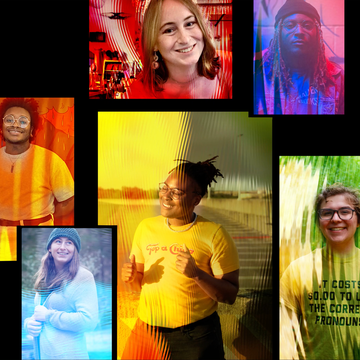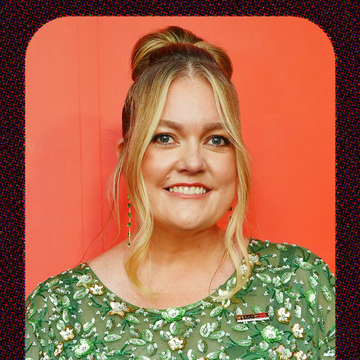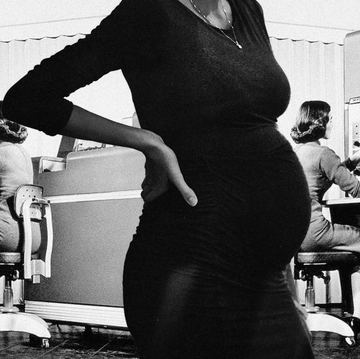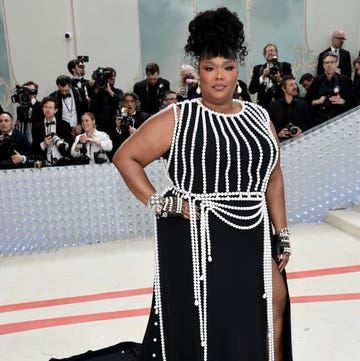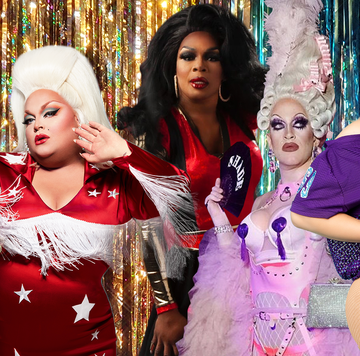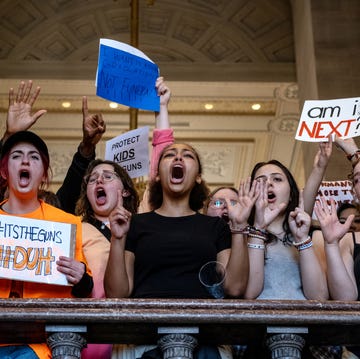Jordan was raised in a Southern Baptist household in North Carolina where she was expected to attend church multiple times a week, accept Jesus Christ as the way to salvation, and honor her mother and father. That last point was right there in the Ten Commandments. So when Jordan made the decision to stop talking to her dad, the choice stood in defiance of the lessons of her upbringing, but it was also because of them. She was tired of being told that women should submit to men, a belief ordained by the religion in which she was raised. She was finished obeying.
Family estrangement flies in the face of what most of us are taught as children: that family is forever and the bonds of blood cannot be replicated. Especially in cultures that value the cohesiveness of the group over more individualistic wants and needs, family is not considered a choice as much as it is a fact. But for families across America right now, that fact is fraying.
If it feels like whispers of estrangement are everywhere lately—in your group chat, at your happy hour, and of course on TikTok—it’s because the data is staggering. Karl Pillemer, a professor at Cornell University and author of Fault Lines: Fractured Families and How to Mend Them, found that in 2020, 27% of Americans over the age of 18 were estranged from a family member. That’s more than a quarter, although the actual proportion could be much higher because many people are still reluctant to discuss such a personal and stigmatized topic. Although there is a lack of long-term research, Pillemer believes estrangement rates are increasing in the United States and other Western countries, especially in white and non-immigrant people under the age of 35. The rise in millennials and Gen Zers coming forward to discuss their own crises—the hashtag #ToxicFamily has 1.9 billion views on TikTok—may suggest that American families are severing ties at an all-time high.
If TikTok is to be believed, attitudes about estrangement fall along generational lines: Boomers accuse millennials and Gen Zers of being too quick to cut contact, while younger generations push back by saying they don’t have to tolerate unacceptable behavior just because someone is related to them by blood. Today, certain young people appear to be far less rigidly beholden to the idea of family obligation above all else, even at the cost of their own happiness.
“The norms that forced families to stick together no matter what have weakened,” Pillemer said, noting that difficult childhood experiences, value and lifestyle differences, and unmet expectations are some of the factors driving estrangement. “There is less of an overwhelmingly normative guideline that you must stick with your family no matter what. There is a sense among younger people today that if the relationship is aversive over a long period of time, they have the ability to get out of it.”
How pervasive family estrangement has become is also evident in pop culture. On her daytime talk show, Drew Barrymore talks about her emancipation from her parents at age 14 and hosts celebrities like Jennette McCurdy, bestselling author of I’m Glad My Mom Died, and Brooke Shields, who opened up about her tumultuous relationship with her mother. But as ubiquitous as the phenomenon can seem, the reality behind each separation is as layered and individual as the families themselves.
When Jordan, 32, decided to leave the church in early adulthood, tension rose between her and her father. Because her parents were married, Jordan says she held back from cutting her dad off despite the fights they had about religion, politics, and her exit from the church. But after one last explosive call, Jordan hung up the phone and had a “moment of clarity.” She realized she was finished, done. Looking back, she says he’s lucky she waited that long. While he called and texted her repeatedly, Jordan didn’t budge. “It’s an extreme privilege to have a great relationship with your adult children,” she says. “I was always hoping [while we weren’t talking] that he would take my silence as a cue to get himself together and to apologize to me.”
The year after their estrangement, Jordan’s dad was hospitalized. She took a red-eye flight to be by her mother’s side and say her goodbyes to her incoherent father, who died after she got there. Now she finds herself grieving a complicated relationship. She thinks she did the right thing, but part of her grief is accepting that she’ll never know if, given more time, he could have ever changed.
Threaded into so many of these stories is the same hope Jordan had: that maybe the nuclear act of estrangement would eventually bring the estranged closer, like cutting hair to try to make it grow longer. That’s how it was for Rose, 21, who says she used to be “Daddy’s princess” before her father’s heroin addiction escalated to the point that Rose felt forced to make a choice. “I hoped that he would say, ‘Oh, my daughter’s no longer talking to me, I should try to fix that so I can talk to her or see her again,’” Rose says. “But sadly, he hasn’t chosen that.” There are so many things about her present life that she wishes she could tell her father: that she graduated high school and dyed her hair, that she got a job working with disabled children and brought a boyfriend home to meet her family. It all happens without her father and still, Rose hopes.
Quincee Gideon, PsyD, a Los Angeles–based psychologist who specializes in trauma therapy, explains that people’s reactions to familial estrangement are mixed and can change over a lifetime. “Some people have a lot of hope that their family can change,” Gideon says. “But by the time folks get to estrangement, they’ve spent years trying to set appropriate boundaries, live with disappointment, accept their family’s flaws, and negotiate in so many different ways that estrangement is a relief.” Such a significant step is best undertaken with the support of a therapist, recommends Gideon. In her own practice, she has clients take small breaks from contact with a family member to gauge the emotional impact. “Was it worth it? Was it relieving? Was it stressful in some way that we didn’t anticipate? Then we go from there.”
The relationship between Holly, 24, and her emotionally withholding and abusive mother was strained for years before she took the final step of estrangement. First, Holly had to make sure logistics were taken care of—she figured out a way to get her birth certificate and Social Security card, which were both stored in her mother’s security deposit box at the bank. Holly ended their relationship with a text message, writing, “I hope you choose a different path in this next part of life, where you choose healing over cruelty and misery. I won’t be there to see it.” Her mother blocked her number without responding. Instead of the grief she’s read about other estranged people feeling, Holly felt something else: a sense of peace.
She knows people may judge her for feeling relieved. A close family member told Holly, “She’s your mother—you should love her,” which Holly finds grating. “We would never tell a woman who’s been abused [by a partner], ‘You should go back to him, to the person who hurt you and will continue to hurt you.’ But we do for people with abusive parents, and it makes me very mad. If I wanted to be miserable and anxious all the time, I’d go back to my mother.”
These stories of family estrangement awaken something almost ancestral in me. I’m Albanian—my parents are both immigrants from Kosovo—and I have never understood family as something to opt in or out of. Being a part of a family is one of the main anchors of my identity—without the knowledge of where I fit as a sister and aunt and cousin, I’m not sure who I would be. In my family, even as relationships are stretched to the point of breaking, it is almost always with the understanding that eventually, they will heal or at least enough time will pass that we can sit at a dinner table together and pretend nothing happened.
Research shows that there are cultural differences at play here. Pillemer, the Cornell professor, notes that the rate of estrangement is highest among white families and lowest among immigrant groups, Latinx families, and Black families. “There is much greater pressure to remain in the relationship among non-white and especially immigrant populations,” he notes. “People may be in extremely conflicted relationships, but they are very unlikely to say, ‘I never want to speak to you again.’” When Pillemer explains this, I can’t help but laugh. I think of the passive-aggressive behavior that lives at the core of some of the dynamics in my family, the unexplored conflict that is swept to the side to make room for a shared morning coffee. Part of me wonders what my family would look like if we entertained the idea that we don’t have to love each other unconditionally. Another bigger part of me is deeply comforted that we will almost certainly always have one other.
But for some, the breaches are simply too profound to overcome. Take Ant, 24, an only child who lives in Florida. The path to Ant’s estrangement from their ultra-conservative parents stretches from an abusive and tumultuous childhood into their understanding of themselves as queer and non-binary. The breaking point came in the summer of 2016, when a mass shooter killed 49 victims at Pulse, an LGBTQ+ nightclub in Orlando. Ant, who had recently been on a date with someone who was supposed to be at Pulse that night, spent the morning after the shooting talking to their date’s sister as they tried to locate them.
Ant’s mother responded to the tragedy by saying the shooting hadn’t happened while Ant’s father used a slur against queer people. “That was the big moment,” Ant recalls. They waited until they turned 18 and graduated high school to make it official, although Ant’s mother still calls them sometimes. “She thinks that she has authority simply for the fact that she’s the mother and I’m the child,” says Ant. “Meanwhile, I can just hang up the phone at any point. I’ve found a chosen family that has allowed me to actually be myself and feel like I can do great things. I do feel very free.”
After making the painstaking decision to cut off a family member, young people then face the daunting task of having to continue to justify their choice, compiling years of slights and heartbreaks into a quick explanation they can relay on a third date. Undoubtedly, millennials and Gen Zers have high expectations for their loved ones and place a higher premium on their own peace, even if it comes at the expense of something as steadfast as the family unit. It would be easy to say young people just don’t care about the sanctity of familial bonds, but I don’t think that’s true. How a family comes together and comes apart isn’t rational or easily explained—it is impossibly tangled. When one thread is pulled, the whole thing can unravel. And I don’t believe that anyone pulls it loose so easily.
Fortesa Latifi is a journalist with bylines in The New York Times, The Washington Post, Teen Vogue, and more. Her work focuses on chronic illness, mental health, and the way politics affects our daily lives and relationships.

